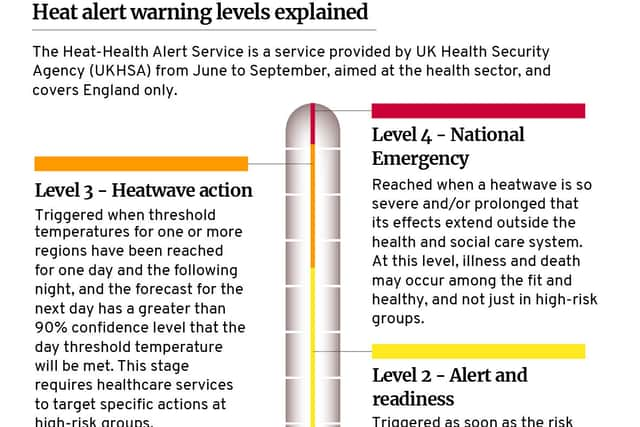Heatwave UK: what is a ‘level 4’ national emergency, could one be declared, what disruption would it cause?
and live on Freeview channel 276
A first ever heatwave emergency response is reportedly being drawn up by government ministers after the Met Office issued a rare amber weather warning for extreme temperatures.
A Cobra meeting was called on Monday (11 July) to discuss plans to deal with the rising temperatures as forecasters warn there is a 30% chance that Sunday will be the hottest day the UK has ever seen.
Advertisement
Hide AdAdvertisement
Hide AdThe amber warning will come into force on Sunday (17 July) as temperatures could reach above 35C in the South East and over 30C for much of England and Wales.
The Met Office has now extended the amber warning into Monday (18 July) as the UK could face temperatures exceeding 40C.
The alert has only been issued twice before and warns of “potential serious illness or danger to life”.


What has the Met Office said?
Temperatures have already started to soar and reached a sweltering 32C on Monday, prompting authorities to issue a heat-health alert on how to keep cool in the heat.
Advertisement
Hide AdAdvertisement
Hide AdThe Met Office has warned there will be a significant risk to those in coastal areas, lakes and rivers because of an increased risk of water safety accidents.
On Sunday, when temperatures are expected to peak, forecasters warn the heat is likely to cause "population-wide adverse health effects", including "potential serious illness or danger to life".
The amber warning is in place from 12.01am on Sunday to 11.59pm, when temperatures are predicted to soar into the 30s, and it will apply across the East Midlands, east of England, London, South East, North East, North West, South West, Wales, West Midlands and Yorkshire and Humber.
The warning has now been extended into Monday with the Met Office warning that “exceptionally high temperatures are possible during Sunday and Monday and could lead to widespread impacts on people and infrastructure.”
Advertisement
Hide AdAdvertisement
Hide AdThe Met Office said: “What to expect: Population-wide adverse health effects are likely to be experienced, not limited to those most vulnerable to extreme heat, leading to potential serious illness or danger to life.
“Government advice is that 999 services should be used in emergencies only; seek advice from 111 if you need non-emergency health advice.”
Could a national heatwave emergency be declared?
A Cobra meeting was held on Monday following the Met Office’s amber warning and a level four heatwave emergency response is reportedly being drawn up, The Telegraph reports.
The UK Health Security Agency (UKHSA) could declare a “level four emergency” if the heat means that “illness and death may occur among the fit and healthy”.


Advertisement
Hide AdAdvertisement
Hide AdA UKHSA spokesman told The Telegraph: "There’s a possibility of a level four heatwave. If it gets above 40C, then it is likely to be a level four heatwave for the first time."
If implemented, it could cause widespread disruption to schools, travel, food supplies, health services and even nuclear power plants.
What is a level four heatwave national emergency?
Central government will declare a Level 4 alert when there is a severe or prolonged heatwave affecting sectors other than health, such as power or water shortages.
It is reached when a heatwave is so severe or prolonged that its effects extend outside the health and social care system, meaning it poses a risk of illness and death among those who are fit and healthy, and not just in high-risk groups.
Advertisement
Hide AdAdvertisement
Hide AdThe decision to go to a Level 4 alert is made at national level and will be taken in light of a cross government assessment of the weather conditions, co-ordinated by the Cabinet Office.
What is the forecast for this week?
A Level Three Heat Health Alert has been issued by the Met Office and the UK Health Security Agency (UKHSA) from 9am on Monday to 9am on Friday in the east and south-east of England, with the rest of the nation having a Level 2 alert in place.
The Met Office says temperatures are predicted to rise to 30C in London, Chelmsford, in Essex, and Sudbury, in Suffolk, on Tuesday (12 July), while the rest of England is expected to see temperatures soar to the late 20s.
The whole of England is largely expected to experience sunny days with some cloud over the next week to match the temperatures of mid to high 20s.
Advertisement
Hide AdAdvertisement
Hide AdIt will cool off a little on Friday (15 July), with the north-west and north-east of England predicted to have some rain with temperatures reaching highs of 19C.
Temperatures are expected to spike to 32C in Reading and London on Sunday (17 July) and in excess of 35C in the southeast.
Meanwhile Scotland and Northern Ireland are predicted to have a cloudier week, with rain forecast for Tuesday and Friday.
Weather forecasting models suggest it is possible temperatures could reach 40C in the UK next weekend.
Comment Guidelines
National World encourages reader discussion on our stories. User feedback, insights and back-and-forth exchanges add a rich layer of context to reporting. Please review our Community Guidelines before commenting.
